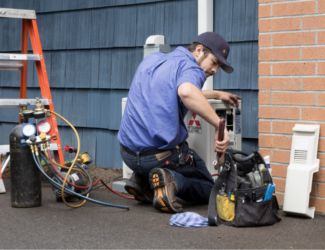
Heat Pump Water Heater (HPWH) facts:
Thank you for your interest in a HPWH. This innovative appliance can save you thousands of dollars over its lifetime. Please review this page to learn more about product benefits as well as installation considerations.
HPWH savings
| 50-gallon standard electric hot water heater | 65-gallon HPWH | |
| Estimated annual electric heating costs | $502 | $277 |
| Estimated annual savings on electric bill | $0 | $225 |
| Lifetime savings (based on 10-year warranty) | $0 | $2,250 |
| ENERGY STAR® Meets or exceeds ENERGY STAR specifications for energy efficiency |
No | Yes! |
*Average is based on the following: 50 gallon 4,500w hot water heater, $0.102/kWh and usage pattern of three people
Benefits & need-to-knows
Big savings
ENERGY STAR certified HPWHs can save a household of three approximately $225 per year on its electric bills compared to a standard electric water heater and more than $2,250 over the HPWH’s lifetime.
Smart investment
While a certified HPWH costs more upfront, the savings will pay back the difference in about three years for a household of four. Replace your aging electric water heater before it fails, and start enjoying the savings right away.
Environmentally wise
If all electric water heaters sold in the United States were ENERGY STAR certified HPWHs, the energy cost savings would grow to about $8 billion each year, and approximately 150 billion pounds of annual greenhouse gas emissions would be prevented, equivalent to the emissions from more than 14 million vehicles.
Installation considerations
- Recovery time: The recovery time, or the time it takes to reheat the water after use, may be longer than with a conventional water heater. This is due to the HPWH’s energy-efficient design, which heats water more slowly as a trade-off for reduced energy consumption. While this may not affect smaller households, larger families or homes with higher hot water demands may notice this change.
- Operating modes: The HPWH is designed to maximize energy savings in “Energy Saver” mode. However, switching to “High Demand” or “Electric Only” modes will increase the heater’s energy consumption, potentially reducing the savings you would otherwise achieve. These modes are available to provide faster recovery or meet higher hot water demands but should be used sparingly to preserve energy efficiency.
- Noise level: HPWHs operate using a fan and compressor, which generate more noise than traditional water heaters. The noise level is typically between 45-55 decibels, which is comparable to a standard dishwasher running. While this is considered a moderate noise level, it may be more noticeable if the water heater is installed in a location closer to living spaces.
- Ambient temperature impact: The HPWH draws in warm air from the surrounding environment to heat the water. As a result, the area around the water heater, such as a garage or basement, may experience a slight drop in temperature. This cooling effect is a natural part of the heat pump’s operation, and while usually minimal, it may be more noticeable in smaller or enclosed spaces.
- Condensation management: During operation, the heat pump water heater dehumidifies the air, producing condensate (water) as a byproduct. This condensate will need to be drained to an approved location, such as an existing floor drain or routed to the exterior of your home. Proper drainage is essential to prevent water damage and ensure the system functions effectively.






